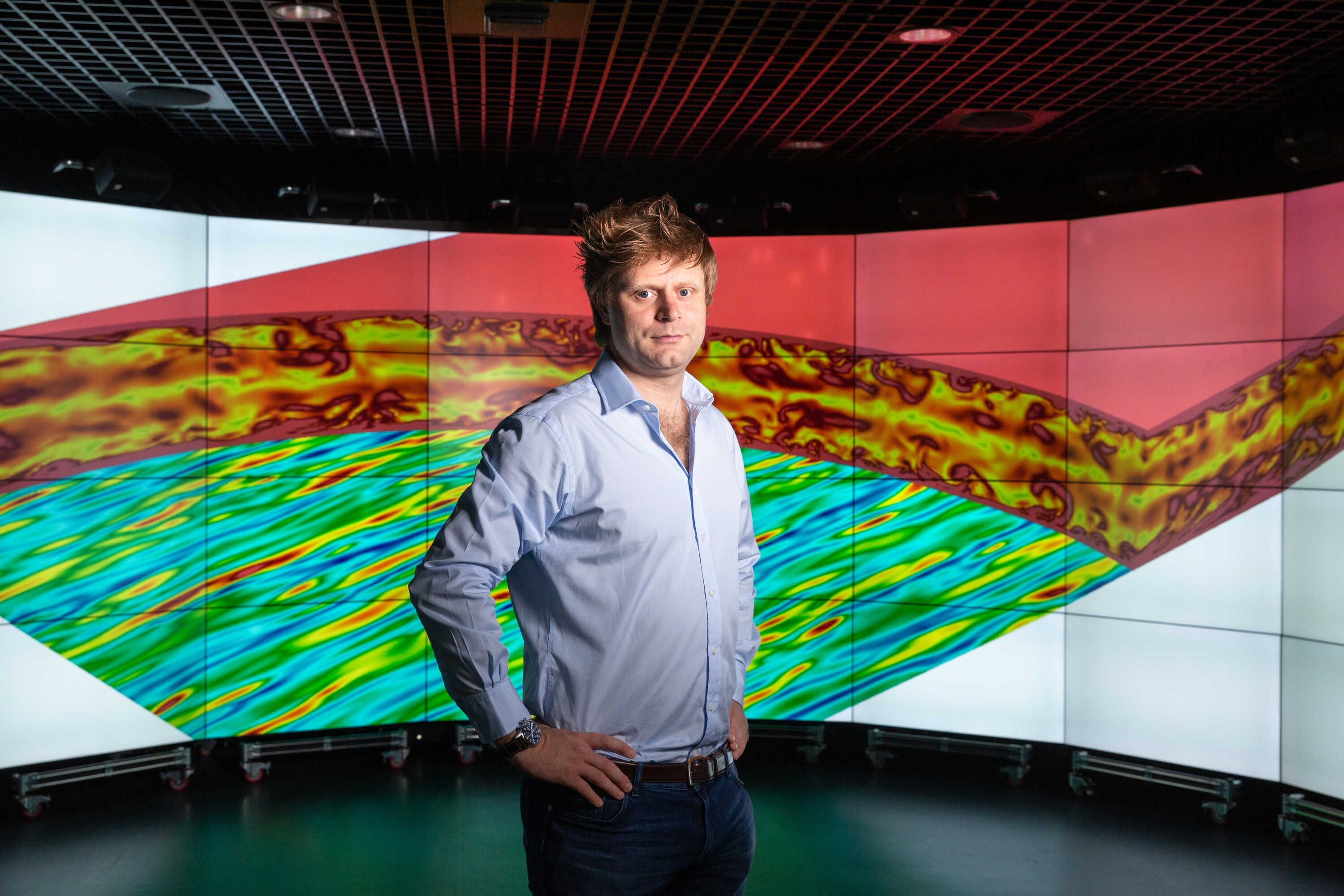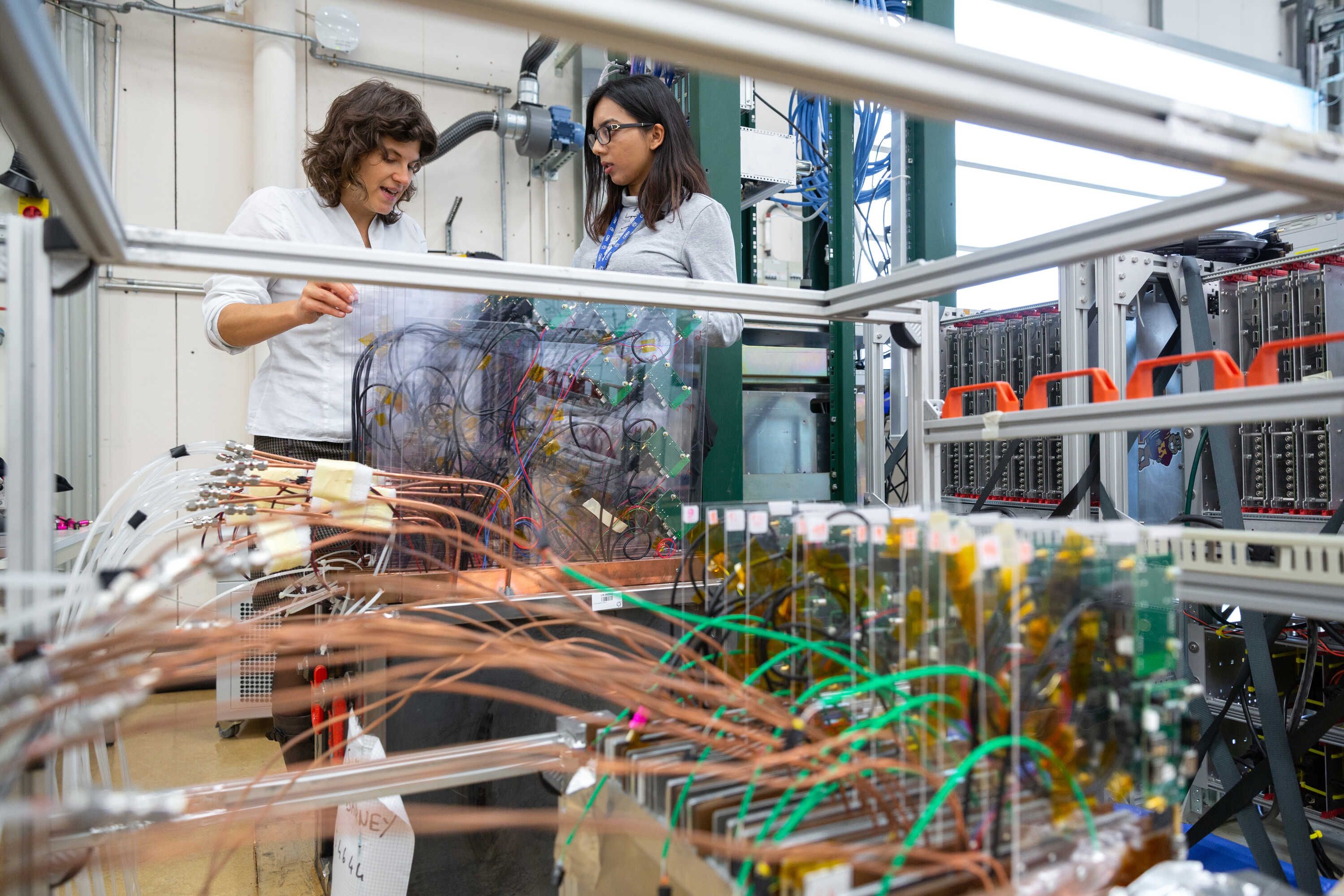
Machine Learning and Big Data in the Physical Sciences
Deepen your understanding of the methodologies used in research involving large data sets.
Deepen your understanding of the methodologies used in research involving large data sets
Learn how to apply tools to real-life experimental data, guided by world-leading experts
Carry out an extended project and apply your data science skills to an area of cutting-edge physics research
Course key facts
-
Qualification
-
MRes
-
-
Duration
1 year
-
Start date
October 2023
-
Study mode
Full-time
-
Fees
£19,400 Home
£38,500 Overseas
-
Delivered by
-
Location
-
South Kensington Campus, London
-
White City Campus, London
-
Minimum entry standard
-
2:1 degree or three years of relevant work experience in quantitative disciplines such as finance, computer engineering, medical clinical and transportation
Course overview
Further your understanding of the methodologies and toolkits used in research involving large data sets on this Master's course.
This programme considers how the field of physics provides a unique development ground for machine learning and artificial intelligence.
You'll examine the use of machine learning and data-science techniques in the acquisition, curation and analysis of large datasets commonplace in modern physics research.
You'll also explore how different techniques can be deployed in real research and how to apply these tools to real-life experimental data.
An extended project forms the major component of this course, providing you with an opportunity to investigate a cutting-edge physics research topic.
You'll learn alongside world-leading experts at Imperial and deploy the latest data science technologies to enhance your research.
Structure
This page is updated regularly to reflect the latest version of the curriculum. However, this information is subject to change.
Find out more about potential course changes.
You’ll take all of these core modules.
Core modules
Build your understanding of the statistics behind large scale data analysis in the physical sciences, and cover key concepts in statistical modelling and statistical inference.
Receive hands-on experience of the techniques required to analyse large data sets and develop your knowledge of the Python computing language.
You’ll also choose at least two optional modules. Example modules are shown here, but availability may vary.
Optional modules
Become familiar with accelerators in computing and learn how to find the best architecture for the problem/algorithm.
Take a look at the “Standard Model” (SM) in detail and discover why it has become so important in the study of particle physics.
Explore finite difference methods to solve differential equations in physics, and design and write computer programs to solve physics problems.
Assess key laser applications and commercially important lasers and discover how to control key laser parameters.
Engage with theories of plasmonics and metamaterials and understand how photonics and nanotechnology can be combined into the new discipline of nanophotonics.
Unpick the theories and models that explain the physical processes that control objects, material and phenomena in space.
You'll undertake an extended research project as the largest portion of your studies.
Here, you will carry out original research embedded in a research group which may be jointly carried out with industry. This will demonstrate your analytics and self-management skills, as well as your capacity to undertake PhD level research.
Your work will be assessed by a written report and a poster and/or presentation of your research findings.
Teaching and assessment
Balance of teaching and learning
Key
- Independent study and research project
- Lectures, tutorials and practicals
- 67% Independent study and research project
- 33% Lectures, tutorials and practicals
Teaching and learning methods
-
Lectures
-
Seminars
-
Research group meetings
-
Hands-on sessions
-
Exercises and practical work
-
Computer-based sessions
-
Virtual learning environment
-
Extended research project
Balance of assessment
Key
- Written examinations
- Practical and coursework
- Research project
- 15% Written examinations
- 18% Practical and coursework
- 67% Research project
Assessment methods
-
Coursework
-
Written examinations
-
Literature review
-
Written reports
-
Oral examination
Entry requirements
We consider all applicants on an individual basis, welcoming students from all over the world.
How to apply
Apply online
You can submit one application form per year of entry. You can choose up to two courses.
We operate a staged admissions process with several application rounds throughout the year.
Apply by midnight (UK time) on the relevant application round deadline to ensure that you receive the outcome of your application by the decision date.
We recommend applying as early as you can – we cannot guarantee that places will be available, or that courses will remain open, in later rounds.
Application rounds
Round 1
- Apply by 4 November 2022
- Decision by 19 December 2022
Round 2
- Apply by 20 January 2023
- Decision by 10 March 2023
Round 3
- Apply by 31 March 2023
- Decision by 12 May 2023
Round 4
- Apply by 26 May 2023
- Decision by 27 July 2023
Round 5
- Apply by 7 July 2023
- Decision by 4 August 2023
If you are applying for a taught Master’s course, you will need to pay an application fee before submitting your application.
The fee applies per application and not per course:
- £80 for all taught Master's applications excluding those to the Imperial College Business School
- £100 for all MSc applications to the Imperial College Business School
- £150 for MBA applications to the Imperial College Business School
There is no application fee for MRes courses, Postgraduate Certificates, Postgraduate Diplomas or research courses, such as PhDs and EngDs.
If you are facing financial hardship and are unable to pay the application fee, we encourage you to apply for our application fee waiver.
Find out more about how to apply for a Master's course, including references and personal statements.
Unless you are from an exempt nationality, you will need an ATAS certificate to obtain your visa and study this course.
Nationals from the following countries are exempt: Switzerland, Australia, Canada, Japan, New Zealand, Singapore, South Korea, USA and EEA members.
Use this information when applying for an ATAS certificate to study this course:
- CAH code: CAH07-01-01
- Descriptor: Physics
- Supervisor name: Professor Michele Dougherty
Get guidance and support for obtaining an ATAS certificate.
Tuition fees
Home fee
2023 entry
£19,400
You should expect and budget for your fees to increase each year.
Your fee is based on the year you enter the College, not your year of study. This means that if you repeat a year or resume your studies after an interruption, your fees will only increase by the amount linked to inflation.
Find out more about our tuition fees payment terms, including how inflationary increases are applied to your tuition fees in subsequent years of study.
Whether you pay the Home or Overseas fee depends on your fee status. This is assessed based on UK Government legislation and includes things like where you live and your nationality or residency status. Find out how we assess your fee status.
If you're a UK national, or EU national with settled or pre-settled status under the EU Settlement Scheme, you may be able to apply for a Postgraduate Master’s Loan from the UK government, if you meet certain criteria.
For 2023-24 entry, the maximum amount is £12,167. The loan is not means-tested and you can choose whether to put it towards your tuition fees or living costs.
Overseas fee
2023 entry
£38,500
You should expect and budget for your fees to increase each year.
Your fee is based on the year you enter the College, not your year of study. This means that if you repeat a year or resume your studies after an interruption, your fees will only increase by the amount linked to inflation.
Find out more about our tuition fees payment terms, including how inflationary increases are applied to your tuition fees in subsequent years of study.
Whether you pay the Home or Overseas fee depends on your fee status. This is assessed based on UK Government legislation and includes things like where you live and your nationality or residency status. Find out how we assess your fee status.
If you're a UK national, or EU national with settled or pre-settled status under the EU Settlement Scheme, you may be able to apply for a Postgraduate Master’s Loan from the UK government, if you meet certain criteria.
For 2023-24 entry, the maximum amount is £12,167. The loan is not means-tested and you can choose whether to put it towards your tuition fees or living costs.
Your future career
Prepare for a variety of roles in research, in particular areas in the physical sciences where large datasets are produced and analysed.
Be equipped for a data science career in industry, where machine learning solutions to data analysis and understanding are key.
Further links
Contact the department
- Email: l.sanchez@imperial.ac.uk
Course Director: Professor David Colling and Dr Nicholas Wardle
Visit the Department of Physics website.

Request info
Find out more about studying at Imperial. Receive updates about life in our community, including event invites and download our latest Study guide.
Request info


Terms and conditions
There are some important pieces of information you should be aware of when applying to Imperial. These include key information about your tuition fees, funding, visas, accommodation and more.
You can find further information about your course, including degree classifications, regulations, progression and awards in the programme specification for your course.
Programme specifications

